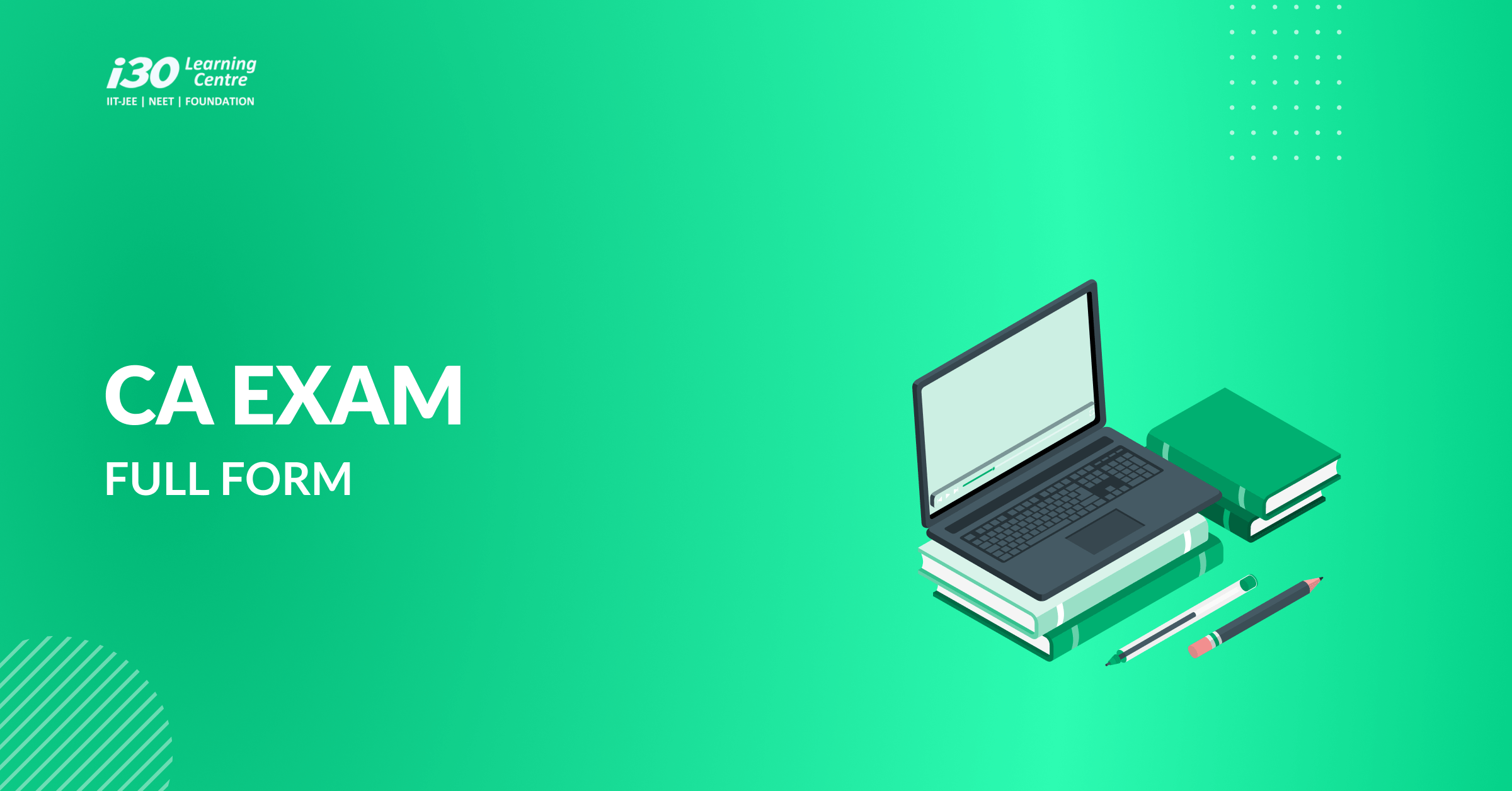Are you considering pursuing a career in chartered accounting? Do you want to know the CA exam full form? Then you are at the right place! In this blog post, we’ll look at the full form of CA, its syllabus, exam pattern, and all other crucial information related to it.
The CA exam stands for the chartered accountancy exam, which is a professional certification exam for individuals who wish to become chartered accountants. Chartered Accountancy is a specialized field in accounting and finance, and the CA exam is one of the most rigorous and prestigious exams in this field.
The CA exam is conducted by the Institute of Chartered Accountants of India (ICAI), which is a statutory body established by the Indian Parliament to regulate and standardize the practice of Chartered Accountancy in India.
The CA exam is known for its challenging nature and low pass rates, which makes it a highly respected qualification in the accounting and finance industry. Chartered Accountants are highly sought-after professionals, and their expertise is required in various areas such as auditing, taxation, financial management, and advisory services.
Let’s find out more about CA Exam Full Form in detail.
What is the CA exam for?
The CA exam is a professional certification exam for individuals who wish to become Chartered Accountants. Chartered Accountancy is a specialized field in accounting and finance, and the CA exam is one of the most rigorous and prestigious exams in this field. The CA exam is conducted by the Institute of Chartered Accountants of India (ICAI) and consists of three levels: Foundation, Intermediate, and Final. Aspiring chartered accountants must pass all three levels of the exam, along with completing a period of practical training, to earn the CA designation.
The CA designation is highly respected in the accounting and finance industry and is recognized internationally. Chartered Accountants are highly sought-after professionals, and their expertise is required in various areas such as auditing, taxation, financial management, and advisory services.In summary, the CA exam is for individuals who aspire to become Chartered Accountants and want to pursue a career in the accounting and finance industry. It is a challenging and prestigious qualification that opens up various opportunities for professional growth and advancement.
Is the CA exam after the 12th?
No, the CA exam is not after the 12th. To become eligible for the CA exam, a candidate needs to meet the following criteria:
Educational Qualification: The candidate must have completed their 10+2 or equivalent examination from a recognized board.
- Registration with ICAI: The candidate must register with the Institute of Chartered Accountants of India (ICAI) for the CA course. The registration can be done after completing their 10+2 examination.
- Completion of CA Course: The candidate must complete the CA course, which consists of three levels: Foundation, Intermediate, and Final. The candidate can appear for the Foundation exam after completing their 10+2 examination.
- Completion of Practical Training: After passing the Intermediate exam, the candidate needs to complete three years of practical training, which includes articles and other training programs.
In summary, a candidate can register for the CA course after completing their 10+2 examination, but they can only appear for the Foundation exam. To become a Chartered Accountant, the candidate needs to complete the CA course and practical training, which takes around 4-5 years to complete.
CA Exam Syllabus
The CA exam syllabus is vast and covers various areas in accounting, finance, and business management. The syllabus is divided into three levels: Foundation, Intermediate, and Final. Here’s an overview of the CA exam syllabus for each level:
CA Foundation Syllabus:
- Principles and Practices of Accounting
- Business Laws and Business Correspondence and Reporting
- Business Mathematics and Logical Reasoning & Statistics
- Business Economics and Business and Commercial Knowledge
CA Intermediate Syllabus:
Group 1
- Accounting
- Corporate Laws and Other Laws
- Cost and Management Accounting
- Taxation
Group 2
- Advanced Accounting
- Auditing and Assurance
- Enterprise Information Systems and Strategic Management
- Financial Management and Economics for Finance
CA Final Syllabus:
Group 1
- Financial Reporting
- Strategic Financial Management
- Advanced Auditing and Professional Ethics
- Corporate and Economic Laws
Group 2
- Strategic Cost Management and Performance Evaluation
- Elective Paper (Choose One): Risk Management, International Taxation, Economic Laws, Financial Services and Capital Markets, Global Financial Reporting Standards, Multidisciplinary Case Study
- Direct Tax Laws and International Taxation
- Indirect Tax Laws
The CA exam syllabus is regularly updated to stay relevant to the changing business environment and accounting practices. It is recommended to refer to the ICAI website for the latest syllabus updates and exam guidelines.
CA Exam Pattern
The CA exam pattern varies for each level of the exam, and the Institute of Chartered Accountants of India (ICAI) sets the exam pattern for each level. Here is an overview of the CA exam pattern for each level:
CA Foundation Exam Pattern:
- Mode: Offline (Pen and paper-based)
- Medium: English or Hindi
- Duration: 3 hours for each paper
- Type of Questions: multiple-choice questions (MCQs)
- Total Marks: 400 marks (100 marks for each paper)
- Negative Marking: 0.25 marks deduction for each incorrect answer
CA Intermediate Exam Pattern:
- Mode: Online (Computer-based)
- Medium: English
- Duration: 3 hours for each paper
- Type of Questions: Objective type multiple-choice questions (MCQs) and Subjective type questions
- Total Marks: 100 marks for MCQs and 100 marks for subjective questions for each paper
- Negative Marking: 0.25 marks deduction for each incorrect answer in MCQs
CA Final Exam Pattern:
- Mode: Online (Computer-based)
- Medium: English
- Duration: 3 hours for each paper
- Type of Questions: Subjective type questions
- Total Marks: 100 marks for each paper
- Negative Marking: No negative marking for subjective type questions
The CA exam pattern is designed to test the candidate’s knowledge and understanding of various concepts in accounting, finance, and business management. It is recommended to refer to the ICAI website for the latest exam pattern updates and guidelines.
FAQ: CA Exam Full Form
1. What Is CA Qualification?
The CA qualification is considered to be one of the most prestigious and challenging qualifications in the field of accounting and finance. It requires a high level of dedication, hard work, and commitment to complete the course and pass the three levels of the exam: Foundation, Intermediate, and Final.
To earn the CA qualification, a candidate must complete the following requirements:
- Educational Qualification: The candidate must have completed their 10+2 or equivalent examination from a recognized board.
- Registration with ICAI: The candidate must register with the ICAI for the CA course.
- Completion of CA Course: The candidate must complete the CA course, which consists of three levels: Foundation, Intermediate, and Final.
- Completion of Practical Training: After passing the Intermediate exam, the candidate needs to complete three years of practical training, which includes articleship and other training programs.
- Passing the CA Final Exam: The candidate needs to pass the CA Final exam to earn the CA qualification.
The CA qualification is highly respected and recognized globally, and it opens up various career opportunities in the fields of auditing, taxation, financial management, and advisory services. Chartered Accountants are highly sought-after professionals, and their expertise is required in various industries and sectors.
2. Age Eligibility for CA
The Institute of Chartered Accountants of India (ICAI) has not specified any age limit for candidates who want to pursue the Chartered Accountancy (CA) course. However, to appear for the CA Foundation exam, a candidate must have completed their 10+2 or equivalent examination from a recognized board.
Generally, most students complete their 10+2 examination between the ages of 16-19 years. However, there is no upper age limit for appearing for the CA exam, and candidates of any age can enroll in the course and pursue the qualification.
It is worth noting that the CA course is challenging and requires a high level of dedication, hard work, and commitment. However, before enrolling in the program, candidates who are interested in pursuing the CA course should carefully analyze the requirements of the course and evaluate their aptitude and skills.
Conclusion:
The CA exam full form is well-known around the world. Candidates must pass all three levels of the exam to pursue the CA qualification. However, every year, the exam format varies for each level. Candidates of any age can apply to the program and pursue the CA course, as there is no age restriction. The CA qualification is highly respected and recognized globally. It opens up various career opportunities in the fields of auditing, taxation, financial management, and advisory services.
Please leave a comment if you have any queries.



